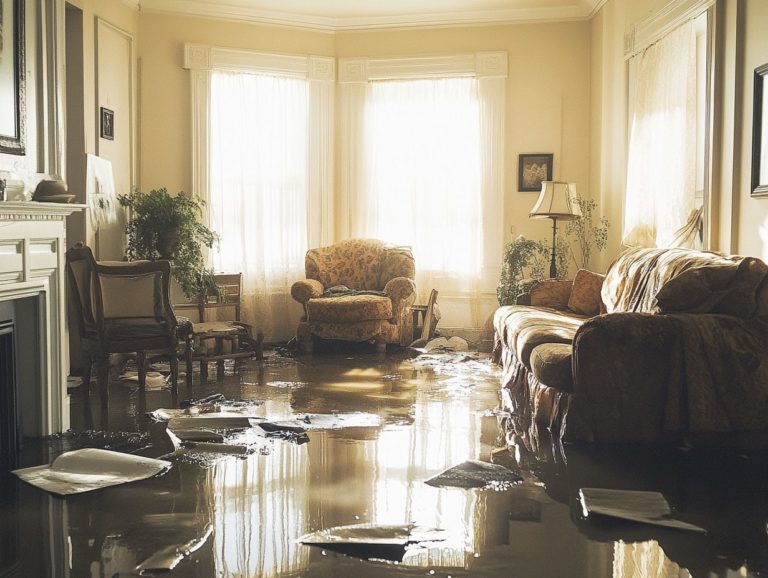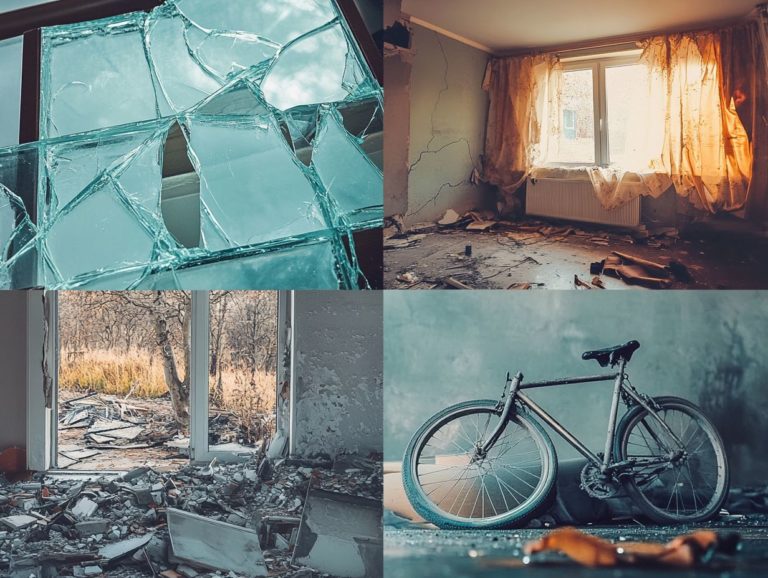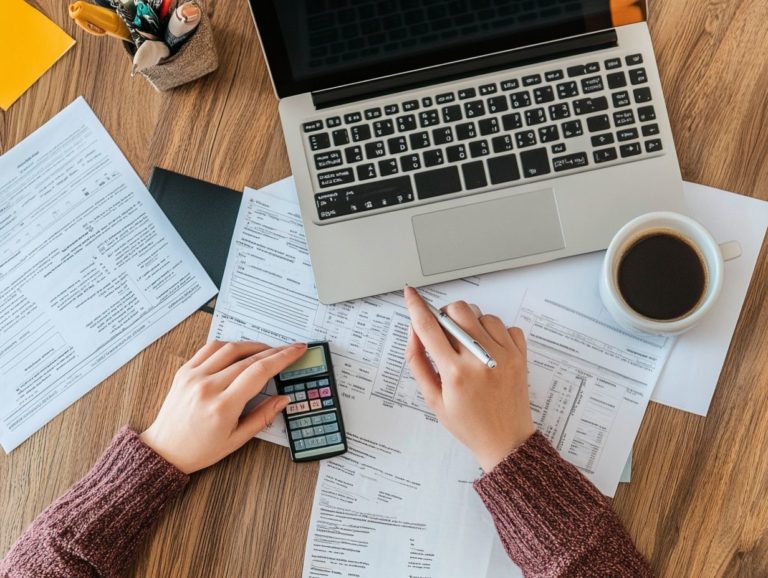What Happens If I Don’t Have Home Insurance?
Home insurance is not merely a safety net; it s an essential safeguard for your property and your peace of mind.
This article delves into the essentials of home insurance. It outlines what it covers and the serious repercussions of being without it. You ll discover potential financial losses and legal complications that can arise, showcasing common scenarios that could lead to devastating outcomes.
It also examines various coverage options and offers practical steps to mitigate risk if you find yourself uninsured.
Stay informed and take proactive measures to protect your home!
Contents
Key Takeaways:
Without home insurance, you risk financial loss from fires, theft, or disasters. Understanding the coverage and cost considerations of different types of home insurance is crucial.
Home insurance provides essential coverage for unexpected events and protects your home and belongings. Having adequate coverage helps avoid potential financial and legal consequences.
Understanding Home Insurance
Understanding home insurance is vital for homeowners. It offers essential financial protection against many risks that come with owning a home. This includes property damage, liability claims (claims for damages you may owe others), and the loss of personal belongings.
This coverage protects your financial interests and those of the mortgage lenders involved, ensuring that your investment in your home remains secure.
Homeowner’s coverage can vary widely. Being well-versed in the nuances of different policies can save you from unexpected financial burdens in the event of a disaster.
The Consequences of Not Having Home Insurance
The consequences of lacking home insurance can be severe, especially for homeowners like you. You face the risk of incurring significant financial loss due to property damage or liability claims.
This can cause serious emotional stress and financial trouble. Without adequate insurance coverage, recovering from natural disasters, theft, or even mishaps that occur on your property becomes challenging.
Such circumstances can directly impact your financial stability and peace of mind, making insurance not just a necessity but a vital safeguard for your home and future.
Financial Loss and Legal Implications
Financial loss and legal implications should be top concerns if you lack homeowners insurance. Without it, you could be held liable for property damage or accidents that occur on your premises. This can lead to hefty legal fees and settlements.
When an incident happens and you don’t have homeowners insurance, the financial burden is entirely yours. This situation could lead to crippling debt or even bankruptcy, so it’s crucial to understand what happens if you don’t pay home insurance.
Consider this: if a guest trips on a broken sidewalk and injures themselves, you might find yourself facing a lawsuit for medical expenses, lost wages, and pain and suffering. These legal claims can easily escalate into tens of thousands of dollars. Without homeowners insurance, you’ll have to cover those costs straight out of your pocket.
If you’re found at fault for a fire that inadvertently damages a neighbor s property, the legal fees associated with that lawsuit could be staggering. This is where liability protection steps in as your safety net against unexpected legal expenses, allowing you to navigate such risks without facing financial ruin.
While some might think they can rely solely on their savings, the unpredictability of accidents and the potential for costly lawsuits underscore the critical need for adequate insurance coverage.
Common Scenarios Without Home Insurance
Without home insurance, you could find yourself in precarious situations that may lead to devastating outcomes. Homeowners face a multitude of risks, from property damage caused by fires and theft to the unpredictable nature of natural disasters like floods and earthquakes.
The financial repercussions of such incidents can be severe, often forcing you to cover repair costs and losses out of your own pocket. This not only strains your finances but can also lead to significant emotional distress.
Summary
Home insurance is essential for protecting your property and peace of mind. It safeguards against financial loss and legal troubles while providing vital coverage for unexpected events. Being informed about your options and ensuring adequate coverage is crucial in maintaining financial stability.
Don t wait until it s too late. Get your home insured today to protect your future.
Fire, Theft, and Natural Disasters
Fire, theft, and natural disasters loom as some of the most common and devastating risks you face as a homeowner. These risks often lead to significant property damage and financial loss. Without home insurance, the costs of repairing or replacing damaged property can become overwhelming, leaving you vulnerable and exposed.
The impact of fire can be catastrophic. It doesn t just destroy structures but also obliterates cherished possessions. Theft robs you of property and disrupts your peace of mind. Natural disasters, like floods or earthquakes, bring their own set of challenges, often causing irreversible damage.
To mitigate these risks, consider tailored insurance options like:
- Flood insurance: specifically covers damages from rising water.
- Earthquake coverage: essential in seismic zones.
Implementing preventative measures such as installing smoke detectors, securing your valuables, and reinforcing your home against natural calamities can significantly bolster your defenses and help reduce the financial burden in the face of unforeseen events.
Options for Home Insurance Coverage
Options for home insurance coverage abound, ranging from basic homeowners insurance to specialized policies designed to meet unique needs, including those mandated by mortgage lenders.
It s essential to grasp the various types of coverage and their associated costs. This knowledge gives you the power to select the right policy that aligns with your specific requirements while ensuring compliance with home insurance mandates.
Types of Coverage and Cost Considerations
The types of coverage available in homeowners insurance can significantly influence your premiums. It’s essential to consider these factors when selecting a policy, especially if you’re working with a mortgage lender.
Elements such as the level of coverage, the specific insurance policy you choose, and the influence of homeowners associations all play a crucial role in determining the final cost of your homeowners insurance.
For example:
- Dwelling coverage: protects your home’s physical structure from hazards like fire, vandalism, or natural disasters.
- Personal property coverage: safeguards your belongings, from furniture to electronics, against theft or damage.
- Liability coverage: provides protection against legal claims and medical expenses arising from accidents on your property.
Each of these coverage types affects your premiums, often influenced by the limits and deductibles you decide on. External factors like the requirements imposed by mortgage lenders and specific mandates from homeowners associations can further complicate the insurance landscape. Understanding all available options is vital to ensure you’re making the best choice for your needs.
Steps to Take Without Home Insurance
Navigating homeownership without insurance can leave you vulnerable to considerable financial risks. That’s why proactive financial planning is crucial; it helps you mitigate potential losses and secure the protection you truly deserve.
Explore your options and team up with insurance agents to find the best coverage! By doing so, you can establish robust safety nets against unexpected incidents, ensuring peace of mind for your investment.
Mitigating Risk and Financial Planning
Reduce risk by planning your finances well. It’s all about establishing safety nets that can shield you from unforeseen circumstances.
By collaborating with insurance agents, you can explore various options to formulate a robust financial strategy that minimizes potential losses and prepares you for emergencies. One practical approach is to create an emergency savings fund, which acts as a financial buffer against unexpected repairs or damages.
You might also consider investing in alternative financial tools, like high-yield savings accounts savings accounts that offer higher interest rates than regular accounts or short-term investment vehicles that provide both liquidity and growth potential.
Educating yourself about different home insurance options, including renters and liability coverage, is essential. Even if you don t initially invest in a comprehensive policy, these options can provide valuable protection.
Ultimately, working closely with knowledgeable insurance professionals can help you craft tailored protection strategies that align with your unique circumstances and financial goals.
Frequently Asked Questions
What happens if I don t have home insurance?
If you don’t have home insurance, you are responsible for any damage to your home. This might lead to high costs you won’t be able to handle.
Is home insurance mandatory?
Home insurance is not required by law. However, if you have a mortgage (a loan to buy your home), your lender might insist on it to protect their investment.
What risks come with not having home insurance?
Without home insurance, you could face several risks. You might struggle to pay for repairs or be held liable if someone gets hurt on your property.
What does home insurance cover?
Home insurance generally covers damage from disasters, theft, and accidents. It also protects you from liability if someone is injured on your property.
How much does home insurance cost?
The cost varies based on your home s location, value, and the coverage you select. Comparing quotes from different companies can help you find the best deal.
Can I get home insurance after something happens to my home?
You cannot get home insurance for events that have already occurred. It’s crucial to have coverage before any damage happens to protect yourself financially.





